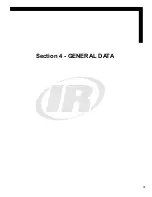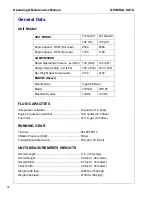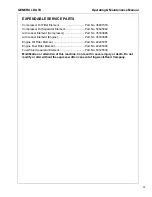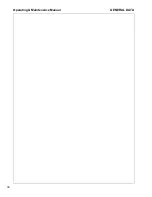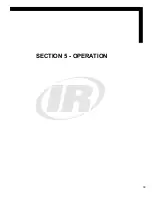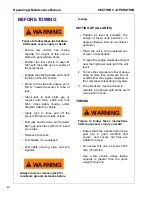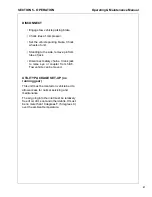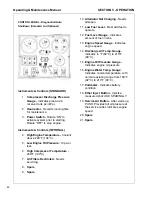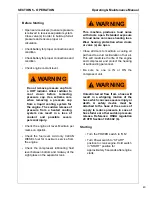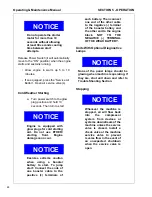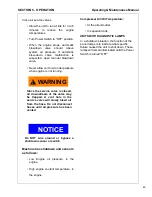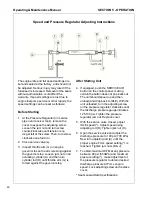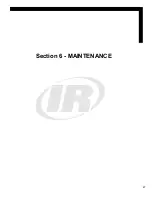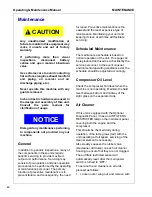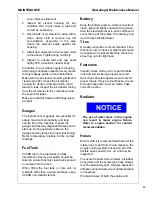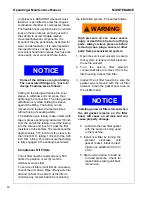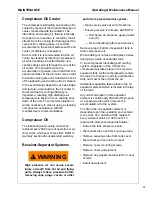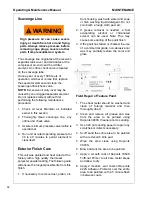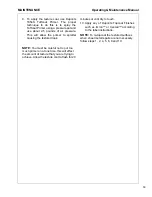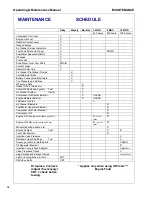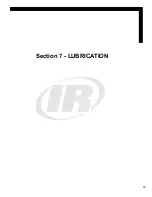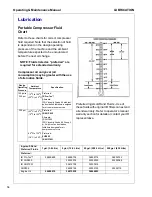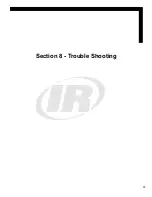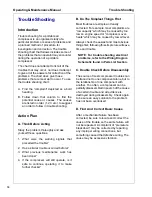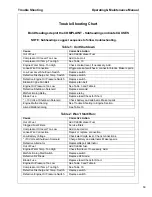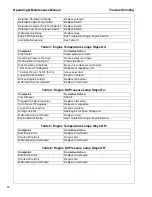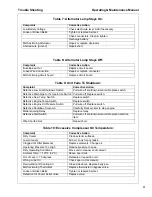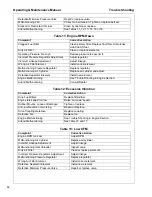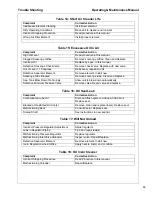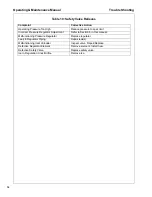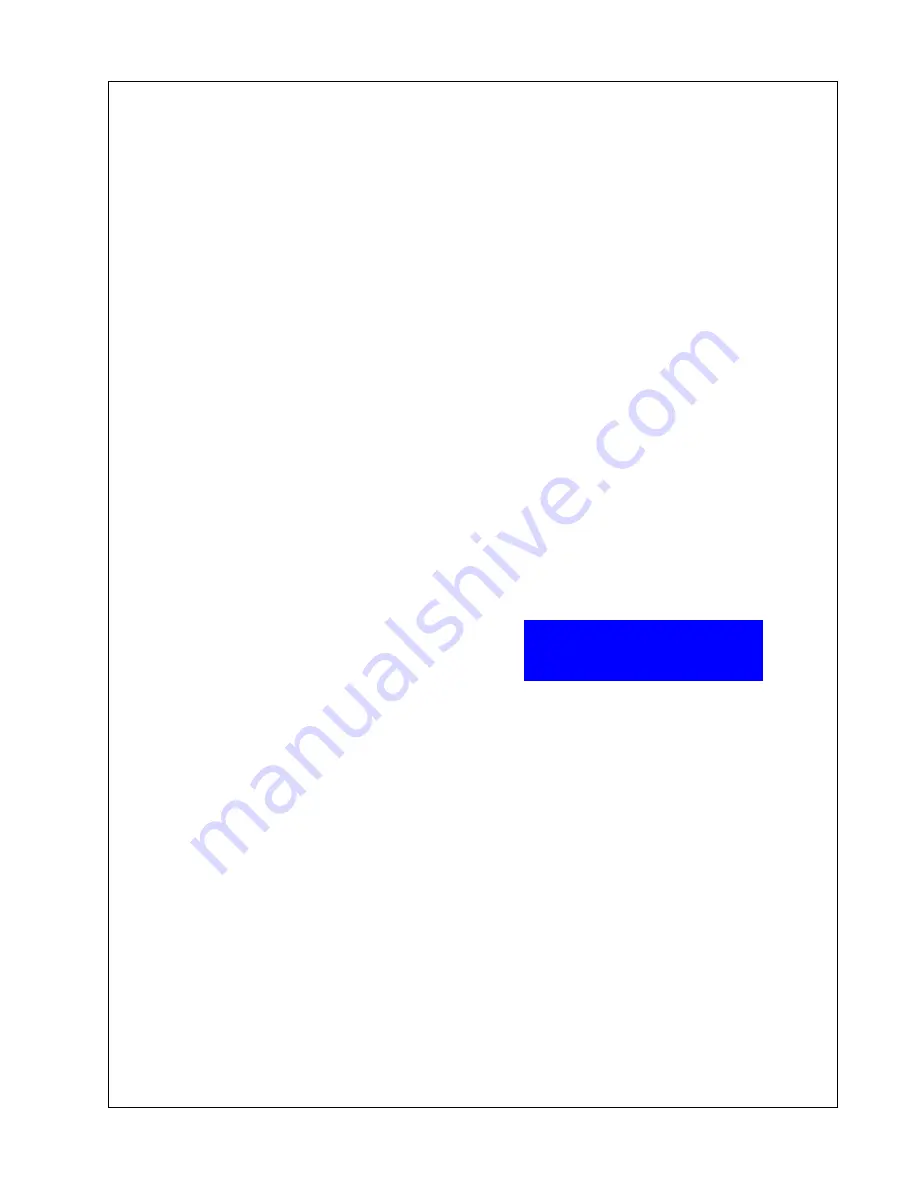
MAINTENANCE
Operating & Maintenance Manual
49
cover. Remove Element.
2. Inspect air cleaner housing for any
condition that might cause a leak and
correct as necessary.
3. Wipe inside of air cleaner housing with a
clean, damp cloth to remove any dirt
accumulation, especially in the area
where the element seals against the
housing.
4. Install new elements in the reverse order
to the above. Tighten wing nut firmly.
5. Inspect to ensure that end cap seals
tightly 360° around air cleaner body.
In addition, the air cleaner system (housing
and piping) should be inspected every month
for any leakage paths or inlet obstructions.
Make sure the air cleaner mounting bolts and
clamps are tight. Check the air cleaner
housing for dents or damage which could
lead to a leak. Inspect the air transfer tubing
from the air cleaner to the compressor and
the engine for leaks.
Make sure that all clamps and flange joints
are tight.
Gauges
The instruments or gauges are essential for
safety, maximum productivity and long
service life of the machine. Inspect the
gauges and test any diagnostic lamps prior to
start-up. During operation observe the
gauges and any lamps for proper functioning.
Refer to Operating Controls, for the normal
readings.
Fuel Tank
CLEAN fuel in the fuel tanks is vitally
important and every precaution should be
taken to ensure that only clean fuel is poured
or pumped into the tank.
When filling the fuel tank on this unit, by
methods other than a pump and hose, use a
CLEAN non-metallic funnel.
Battery
Keep the battery posts-to-cable connections
clean, tight and lightly coated with a grease.
Also the electrolyte level in each cell should
cover the top of the plates. If necessary, top-
up with clean distilled water.
Tires
A weekly inspection is recommended. Tires
that have cuts or cracks or little tread should
be repaired or replaced. Monthly check the
wheel lug nuts for tightness.
Fasteners
Visually check entire unit in regard to bolts,
nuts and screws being properly secured.
Spot check several capscrews and nuts for
proper torque. If any are found loose, a more
thorough inspection must be made. Take
corrective action.
Radiator
NOTICE
The use of water alone in this engine
can result in major engine failure.
Refer to engine section for coolant
recommendation.
Hoses
Each month it is recommended that all of the
intake lines to and from the air cleaners, the
engine cooling system hoses and all of the
flexible hoses used for air, oil, and fuel be
inspected.
To ensure freedom from air leaks, all rubber
hose joints and the screw-type hose clamps
must be absolutely tight. Regular inspection
of these connections for wear or deterioration
is necessary.
Premature wear of both the engine and
Summary of Contents for P185AWIR
Page 6: ...1 4...
Page 7: ...3 FOREWORD...
Page 8: ...4...
Page 10: ...6...
Page 11: ...7 DRAWBAR NOTICE...
Page 12: ...Operating Maintenance Manual 8...
Page 14: ...Operating Maintenance Manual 10...
Page 15: ...11 Section 1 Safety...
Page 19: ...Safety Operating Maintenance Manual 15...
Page 20: ...Operating Maintenance Manual Safety 16...
Page 22: ...Operating Maintenance Manual Safety 18...
Page 23: ...Safety Operating Maintenance Manual 19...
Page 25: ...21 Section 2 WARRANTY...
Page 30: ...Operating Maintenance Manual WARRANTY 26...
Page 32: ...Operating Maintenance Manual WARRANTY 28...
Page 33: ...29 Section 3 NOISE EMISSION...
Page 39: ...35 Section 4 GENERAL DATA...
Page 42: ...Operating Maintenance Manual GENERAL DATA 38...
Page 43: ...39 SECTION 5 OPERATION...
Page 51: ...47 Section 6 MAINTENANCE...
Page 59: ...55 Section 7 LUBRICATION...
Page 61: ...57 Section 8 Trouble Shooting...

